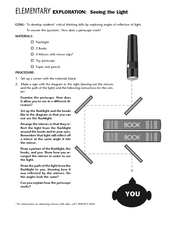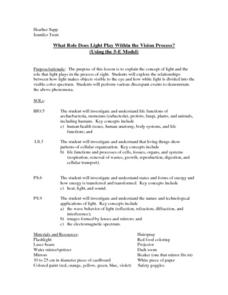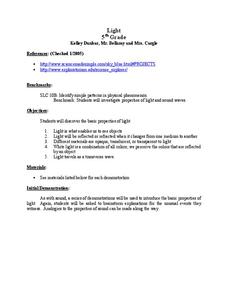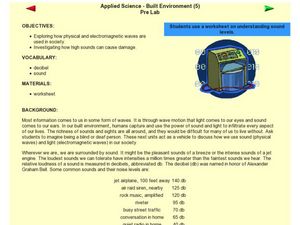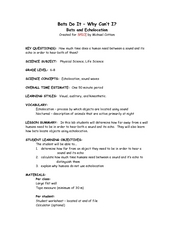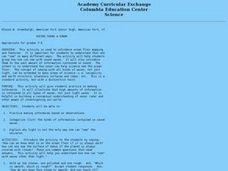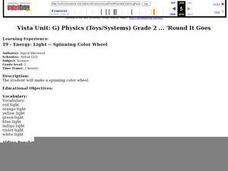Curated OER
Elementary Exploration: Seeing the Light
Students use critical thinking skills to learn about light, sound, and matter. Students follow the procedure steps to complete a light, sound, and matter experiment.
Curated OER
What Role Does Light Play Within the Vision Process?
Students are introduced to the relationship between light and vision. In groups, they participate in experiments to discover how different wavelengths are divided in the visible spectrum. They record their answers and discuss their...
Curated OER
Light
Fifth graders sit in their seats with the lights on and then the teacher turns off the lights. After their eyes have adjusted, they vote on what colors of construction paper are being held up. The lights are then turned back on and...
Curated OER
Applied Science - Built Environment (5) Pre Lab
Fifth graders look at the impact of sound and noise. In this sound instructional activity, 5th graders review the decibel and common sounds along with their noise levels. They complete a worksheet about the different sounds that one...
Curated OER
Bats Do It-Why Can't I?
Students explore echos and how they are utilised in navigation. In this sound lesson students calculate the amount of time between a sound and its echo.
Curated OER
Sizing Up Sound
Sixth graders are introduced to the concepts of sound waves and frequency. As a class, they listen to the differences between different types of instruments. To end the instructional activity, they practice identifying low and high...
Curated OER
Wave Actions
In this waves instructional activity, high schoolers read about the ways waves react depending on the boundary they encounter. They read about natural frequency, resonance, phases and interference in waves. They match 13 terms with their...
Curated OER
Wave Action
In this wave worksheet, students compare the different ways a wave can react: absorption, reflection, refraction, and diffraction. Students also read about constructive and destructive interference. This worksheet has 13 matching, 10...
Curated OER
Applied Science - Physics (5A) Pre Lab
Fifth graders look at different types of waves. In this wave instructional activity, 5th graders find the difference and similarities of electromagnetic and physical waves. They review the components of waves such as crest, trough,...
Curated OER
Energy Motion in the Ocean
Students explore the wave energy that is generated and transferred in the ocean. Through the use video and the Internet, students explore the aspects of a wave and how its energy affects the ecology of the seashore.
Curated OER
STRAINING FOR SOUND
Sixth graders use a laser along with computer microphone probeware and the appropriate software, 6th graders determine the speed of rotating objects.An audio amplifier is connected to a solar cell to change the laser light signal into a...
Curated OER
The Doppler Effect Lab
In this Doppler effect worksheet, students read information about the Doppler effect. Students answer questions as it relates to the pitch and wavelengths of a demonstration simulates what happens with the Doppler Effect.
Curated OER
Vibration and Pitch
Fifth graders investigate the relation between vibrations and pitch. They observe and discuss an experiment involving a bicycle and a piece of cardboard in the spokes, listen to a comb with cardboard, and listen to various sounds and...
Curated OER
Seeing Sound and Sonar
Young scholars grasp how underwater animals can "see" using sound waves. They practice making inferences, and build a conceptual understanding of sonar radar.
Curated OER
Make a Sound Viewer
Students see, and thus better understand, the vibrations that sound makes through this simple project.
Curated OER
Making Waves, Making Music, Making Noise
Sixth graders watch a demonstration on how talking cans produce sounds. In groups, they compare and contrast the sounds from different sized cans. They participate in a variety of activities to discover how sounds are made and how...
Curated OER
Waves, Sound, and Light
Ninth graders explain waves in terms of energy transfer and describe their basic types and characteristics. They solve mathematical problems involving wavelength and frequency. Students conduct experiments in reflection and refraction.
Curated OER
Energy: Light -- Spinning Color Wheel
Second graders make spinning color wheels to determine how energy effects what colors look like. They paint or color a color wheel with the seven colors of the spectrum. Next, the spin the wheel to determine what happens. In order to...
Curated OER
AC Waveforms
In this AC waveforms worksheet, students answer ten questions about AC voltage, frequencies of waveforms and they interpret diagrams of AC voltage.
Curated OER
Radiation from Space
In this radiation worksheet, students review the different types of radiation waves that come from space and the different telescopes used to detect this radiation. This worksheet has 17 true or false questions.
Curated OER
Hello, Is Anybody Out There? (cont.)
In this space science worksheet, students read an informative passage about radio waves and the possibility of sending messages in space. The passage describes a "Sounds of Earth" record on the Voyager satellite which contains messages...
Curated OER
Investigation of Timbre
Students design an experiment to analyze the timbre of different instruments. In this physics lesson, students analyze the missing quality in sound. They discuss their results in class.
Curated OER
How Do Bats Navigate At Night?
Through an experiment, learners explore how bats use echolocation. First, they discuss how sound travels through air waves. Then, they talk about the ways bats navigate in the dark. As an extension, they can write about what they have...
Curated OER
Let the Sunshine in
Pupils collect and analyze data to study wavelengths of visible light. They cover Styrofoam cups with three different colors of sun filtering products and shine a lamp directly on the cups. They determine the most effective filtering...


